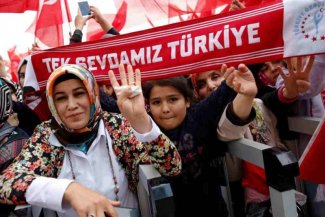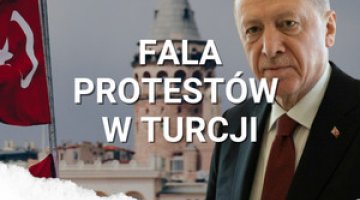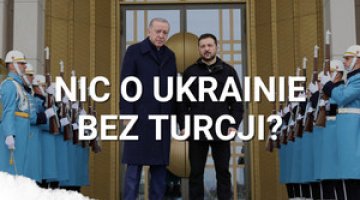The constitutional referendum – another step towards a New Turkey

On 16 April the citizens of Turkey voted in a national referendum to amend the constitution. This will lead to a radical strengthening of the president’s power. 51.4% of the voters backed the amendments. They will come into force after the next presidential and parliamentary election (scheduled for 2019). The amendments are an important step in the thorough reconstruction of the Republic of Turkey which began in 2002. They will strengthen the position of Recep Tayyip Erdoğan in legal terms, and – with all the controversies that entails – will adjust the legal status to the situation on the ground. The outcome of the referendum helps to temporarily stabilise the internal situation in Turkey and allows the country to be more active on the international arena; this includes making another attempt to thoroughly revise its relations with the EU. However, the amendment of the constitution is of a technical nature and is a means rather than an end in the process of building a New Turkey. Thus the calming of the situation in Turkey is temporary.
The constitutional amendments
The referendum concerned 18 constitutional amendments proposed by the governing Justice and Development Party (AKP) backed by a section of MPs from the opposition Nationalist Movement Party (MHP). The changes provide above all for a radical strengthening of the president’s position. At present, from a formal point of view, this is primarily a ceremonial office and real power rests with the prime minister who must defer to parliament; the president cannot be a member of any political party.
Pursuant to the amendments adopted, the president will gain full executive power and the office of prime minister will be liquidated. The president will have the power to nominate vice presidents and ministers by himself. The parliament’s autonomy and role will be curtailed. The obligation for the president to remain outside any political party will also be removed, which will strengthen the president’s political base. The presidential and parliamentary elections will be held on the same day, which will practically rule out the possibility of the president ruling the country in co-operation with a parliament dominated by the opposition. The president will be able to pass the budget without the need to obtain consent from parliament and will be able to pass decrees that will have the same effect as laws (unless a given issue is not regulated under a relevant law[NF1] [ks2] ). The amendments also limit the scope of interpellations from MPs.
The reduction in the number of members of the Supreme Board of Judges and Prosecutors from 22 to 13 is an essential change. Four of these members will be nominated directly by the president, two by the Ministry of Justice reporting to the president, and the others by parliament (dominated by the presidential party by assumption). The competences of the military courts, which until recently were strong, will be limited to military issues and wartime. In practice, the president will gain control of the judiciary.
The constitutional amendments in Turkey will take effect following the next presidential and parliamentary elections which are scheduled for 2019.
AKP rule – the regulated revolution
The constitutional amendments are a reflection of the fundamental and volatile changes which have been taking place in Turkey since 2002, i.e. since AKP took power. Throughout this period, Turkey has been undergoing a process of the thorough disassembly of the old post-Kemalist system. The change concerns the institutional (the real elimination of the army as the central and superior state institution), social (marginalisation of the post-Kemalist establishment, above all public servants) and cultural aspects (for example, questioning the radically secular and nationalist character of the state).
AKP has canalised and reinforced the emancipation processes which had been ripening among the public (for example, the effect of decades of modernisation of the Anatolia province) and has capitalised on the accumulating identity crisis resulting from the burnout of the statist model of secular modernisation. AKP made a successful and flexible synthesis of republican and nationalist slogans, of pro-democratic, pro-European and pro-market aspirations, and of conservative and Islamic values followed by the rehabilitation of Turkey’s Ottoman and imperial past. By successfully channelling social trends and creating conditions for the country’s uninterrupted economic development, the government contributed to a gradual formation of the new administration, financial and opinion-forming elites, and in effect, to the crystallisation of a new socio-political order in Turkey. The undisguised goals of the changes in Turkey include the creation of a new quality (New Turkey) and the return of its historical position of a political, economic and also civilisational centre on a de facto global scale. AKP’s agenda and policy have enabled the party to govern the country by itself since 2002 and have ensured it consistently strong public support over the past decade ranging between 40% and 50%. Given the fact that Recep Tayyip Erdoğan has uninterruptedly been the party’s leader, and also considering his charisma and the fact that there is no alternative to him, he is the personification of the party and the true leader of Turkey. The co-authors of AKP’s policy have been successfully marginalised at different stages (for example, the former president Abdullah Gül, and the ex-prime minister Ahmet Davutoğlu).
AKP’s rule has offered Turkey unprecedented civilisational and economic progress but has also generated enormous tension and conflicts. At various stages, AKP and Erdoğan personally have faced resistance from the old elites and also various social and political groups. This concerned above all the army and also nationalist parties and circles. Over time, the resistance also extended to the section of the public holding liberal views (for example, the mass protests concerning the Gezi park in 2013), left-wing groupings (from moderate pro-Kurdish groups to the terrorist Kurdistan Workers’ Party) and radical Muslim circles (including terrorism linked to Islamic State). Finally, conflicts inside the government camp (for example, with the Gülen Movement) also became visible. The climax was reached when a section of the army and probably Gülen’s supporters staged the unsuccessful coup on 15 July 2016. The resulting huge staff reshuffle inside the state apparatus (army, offices, judiciary and education system) and outside it (for example, in the media and business) on the one hand allowed the most serious opponents of the government to be marginalised and, on the other, helped consolidate the political and social support base. The government has thus become stronger and saw an opportunity to accelerate the process of building a New Turkey. The amending of the constitution and the referendum were intended to organise the moment of the turning point in the Turkish policy.
Amending the constitution – a response to temporary needs
The primary task has been to enshrine the position of Recep Tayyip Erdoğan in law and to secure him as the personification of Turkey’s transformation. Regardless of the real power he has in Turkey and AKP itself and his skill of capitalising on subsequent crises to strengthen his position and, finally, his image among voters as the saviour and guarantor of the country’s stability and development, his formal position had been weak. The president’s competences are still ceremonial, and he cannot be a member (not to mention the formal leader) of any political party, in this case the governing party.
The proposed constitutional amendments give Erdoğan the necessary minimum: since power will be concentrated in the president’s hands, the influence he genuinely has in the state at present will be codified. In turn, the permission to be a political party member will return direct control of AKP into his hands. As parliamentary and presidential elections are being held simultaneously, the dependence of the parliamentary majority on the leader (the natural engine of the election campaign) will increase. Given Erdoğan’s present personal popularity, the weakness of the opposition parties and their leaders, and the depleted competences of parliament in general, this appears to guarantee his future ‘democratic’ victories. The keystone of the changes is the fact that the judiciary system will be subordinated to the president. This will allow the reconstruction of the currently unreliable and depleted (following purges) judiciary system in compliance with the president’s expectations.
The amendments of the constitution thus lead to a radical centralisation of power in the president’s hands, at the same time cancelling the principle of independence and balance of the executive, legislative and judiciary powers.
Even though the draft constitutional amendments were backed by the parliamentary majority necessary to hold the referendum (AKP and a group of MPs from MHP), serious limitations which the government would have to face were also revealed. First of all, AKP had to withdraw from its plans to adopt a completely new constitution that would revise the ideological foundations of the state (Kemalism, nationalism and secularism). Only this compromise resulted in support from a section of MHP deputies, which made it possible for the referendum to be held. The referendum also became a catalyst of resistance from the hard-line opposition (CHP, and the pro-Kurdish People’s Democratic Party, HDP) and also provoked tension inside AKP (the fear of strengthening Erdoğan’s personal position). This means that although the amended constitution is a necessary and purely technical stage of the changes, it still does not satisfy the aspirations of AKP and Erdoğan himself.
The difficult referendum campaign
Despite the dominance of AKP and Erdoğan on the Turkish political scene and martial law which helps the government (announced after the coup on 15 July), the government camp had to employ all measures available to ensure the victory. The highly intensive election campaign was also characteristic—the president and Prime Minister Binali Yıldırım were personally engaged attending events all over Turkey and both private and public media outlets were used.
The campaign focused on making reference to Turkey’s unquestioned civilisational achievements under AKP’s rule. At the same time, attention was attracted to the existential threat posed by the forces opposing the changes (identifying them with those responsible for the coup, terrorists, etc.), and hence the need to consolidate the public around a strong leader, namely Erdoğan. Nationalist and civic slogans alike were also intensely used in the campaign advocating the changes. The civic slogans concerned above all ‘sovereignty of the people’ over the institutions and the existing legal order. Attempts were also made to balance the Turkish nationalism with declared openness to ethnic and religious minorities (for example, Kurds and Alevis who are loyal to the state). Another essential element of the campaign was drawing on the Great Turkey idea, i.e. a country responsible for the areas which have historical links with Turkey but remain outside its borders, as well as affirming and mobilising the Turkish diaspora (above all in Western Europe). The problems with relations with EU member states, including difficulties with conducting the election campaign in Europe, were used to strengthen the negative perception of Europe (as being anti-Turkish and Islamophobic). They were intended to intensify the sense of threat and point to the lack of an alternative to a strong Turkish state as the protector of the rights of Turks worldwide.
The campaign run by the opposition parties was much weaker than that of the government. The main reason for this weakness was the consequences of the repressions waged by the government – for example, the leaders of the opposition party HDP have been under arrest since last November on charges of supporting terrorism; many opponents of the government have been detained as part of the investigation wave following the coup, while others may feel intimidated. The opposition clearly had less access to the media and less funds at its disposal. Finally, when compared to AKP, it displayed marginal public activity (CHP leaders chose not to have large-scale contacts with voters and entrusted local structures with the task of holding rallies).
In ideological terms, the government has been accused of disassembling Turkey’s institutional and legal order, Erdoğan’s authoritarian ambitions, the illusory stability embodied by AKP, and, finally, the founding myth of the present stage of transformation in Turkey was undermined, i.e. the significance of the coup in 2016 (allegations that the government was engaged in the coup, fundamental reservations regarding the findings made so far in the investigations following the coup). As regards the referendum, the opposition mainly pinned their hopes on the assumption that the public are tired with the tempo of the changes, the lack of understanding of the sense of the changes and the hidden erosion of AKP’s base (manifestations of this included, the fact that the recent co-leaders of AKP distance themselves from the ‘yes’ campaign, some ostentatiously, such as Abdullah Gül).
The fact that the constitutional amendments were adopted with a support level of 51.41% (with turnout at 85.3%) basically confirmed the assumptions of both sides. The active ‘yes’ campaign made it possible to increase the support level for the changes by around 10% (the level of support in the first forecasts was around 40%). The ‘no’ campaign revealed a strong negative electorate opposing the changes. The OSCE’s post-election report emphasised the systemic inequality of opportunities for the opposition to conduct an election campaign.
The controversies over the validity of some ballots overshadowed the campaign. According to CHP, the number of unstamped ballots could be as high as 1.5 million – however, this allegation was rejected by the Supreme Election Board (YSK). One of the YSK’s functions is the instance supreme appeals, and the election result itself was considered valid. Regardless of the high tension accompanying the referendum, no massive public protests were seen after its result was announced (small groups of protesters picketed in major cities).
Conclusion and forecasts
The amendment of the Turkish constitution as a result of the referendum is a quantum leap in the process of building the New Turkey. The constitutional amendments seem to preordain the irreversibility of the disassembly of the old political system. The referendum spells a definite withdrawal of the democratic state model based on a balanced tripartite division of power and replacing it with a model based on the dominance of the presidential office and a mandate obtained directly from voters. This process is reinforced by the government’s informal control of the media market, political control of the state apparatus, informal dominance in the economic sphere and the temporary conditions of martial law. The possibilities of politically counteracting these trends are at present minimal. Nevertheless, the process of determining the details and bringing the New Turkey project closer to reality is far from over—the recent constitutional amendments are mostly technical, and they will only be implemented after the next election.
The way the referendum was held and its outcome have strengthened the position of Recep Tayyip Erdoğan on the Turkish political scene. He has gained legal confirmation of his position as the leader of the republic. Furthermore, the fact that the vote was held nationwide, preceded by an intense election campaign, has consolidated his social support base and added a social mandate to his ambitions. At the same time, the referendum has confirmed and potentially also cemented the opposition’s inability to block his policy, not to mention their inability create a constructive alternative to Erdoğan.
The referendum offers Turkey a chance for a temporary stabilisation: the government has renewed its public mandate to rule the country, the opposition does not currently pose any real threat, and the emotions accompanying the campaign are fading (proof of this includes the lack of major protests). The government can now resume the policy of structural reforms in the economy that have been slowed down due to the political volatility. Turkey’s internal stability and hopes for further reforms are desirable and have been noticed by the financial markets—the Turkish currency has strengthened and the bond interest rate has fallen.
However, regardless of the temporary prerequisites for the stabilisation of the situation in Turkey, the country is in the process of a deep and risky internal transformation. The threats are linked, for example, to the transitional period preceding the constitutional amendments entering into force following the next election. Erdoğan has been forced to reorganise his political base (steps have been made to prepare the reinstatement of his membership of AKP before the election), remove people who are not loyal enough from the party and to prepare the party for the election. The opposition is about to face equally serious challenges. CHP will certainly feel forced to revise its policy and expand its voter base (it can count on a hard-line electorate of 20–30%). In turn, the Nationalist Movement Party needs to decide whether it should continue its symbiosis with AKP or become a radical opposition; there is great tension inside the party regarding this choice. The changes on the political scene mean it is impossible to rule out snap parliamentary and presidential elections being held, which would lead to the political situation in the country becoming strained again.
Another challenge, even more serious, is the amount of systemic tension inherent in Turkish politics and its unpredictability (serious upheavals and turbulence affect Turkey once every six months on average). These problems (only seemingly limited to the south-eastern part of the country) include the conflict inside the PKK and the lack of a positive agenda for a breakthrough in relations between the state and the Kurdish minority. At the same time, the growing threat of Islamic radicalism and terrorism is an open question. The problem of both nationalism (Kurdish and Turkish) and Islam are of key significance in the process of developing a new state ideology – and both are equally socially controversial. Another challenge is the strong potential of hidden public dissatisfaction which was manifested with great strength already in 2013 (millions of people took to the streets across the country as a result of a local dispute over the development of the Gezi Park in Istanbul). The last of the chronic challenges Turkey and its government are facing is the constant risk of mutiny inside the elite – it does need to be emphasised that revealing the scale of the conflict between Erdoğan and the Gülen Movement (since 2013) and the decision to try to stage a coup inside the seemingly pacified army (2016) came as a surprise. Erdoğan has so far successfully coped with such challenges, and even capitalised on them to strengthen his position. However, a different scenario cannot be ruled out (and this would pose the risk of a deep and long crisis).
Erdoğan’s victory in the referendum also makes it possible to expect activation in international politics. This is temporarily linked to the end of the intense pre-election campaign and focusing on domestic issues, and the sense of the president’s position being strengthened after the victory. Erdoğan plans to visit the USA, Russia, China, India and Brussels in May 2017 alone. This proves that the president is determined to resolve the mounting problems linked to the situation in the Middle East (Syria, Iraq and the Kurds) and the controversies in bilateral relations (the USA and Russia) as well as the intensification of supra-regional co-operation, above all economic (with China and India). In the broader context, this is a return to the ambitions of increasing Turkey status as an independent player and marking its role in global politics.
However, relations with the European Union play a special role in Turkish politics at the moment; hence the significance of the planned visit to Brussels. The strength of the multi-level co-dependencies between Turkey and Europe is proportionate to the escalating misunderstandings and mutual recriminations. Those from the EU include sharp criticism of the authoritarian tendencies in Turkey or of Turkey’s playing on the issue of the Turkish minority in Europe. In turn, those from Turkey include allegations of using double standards (partly caused by anti-Turkishness and Islamophobia), the EU’s failure to comply with its obligations to Turkey regarding financial issues and visa liberalisation, and tolerating the PKK in the EU. Both in Turkey and in the EU (as manifested, for example, by the tension surrounding the referendum campaign in Europe), the mutual controversies are escalated and successfully used on the domestic arena. Given this context, it is likely that Erdoğan – strengthened in his opinion by the outcome of the referendum and the effects of the foreign visits this May – will make another attempt at a thorough revision of political relations with the EU aimed at replacing the ineffective European integration with a format based on the two parties treating one another more as equal partners and basing bilateral relations more on mutual deals.
[NF1]I don’t understand this.
[ks2]Alternatywna wersja nawiasu w tłumaczeniu Józka:
(yet only in the case if a given issue is not regulated under a relevant law)




